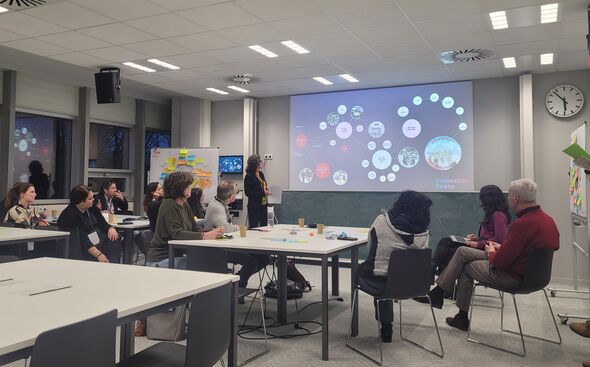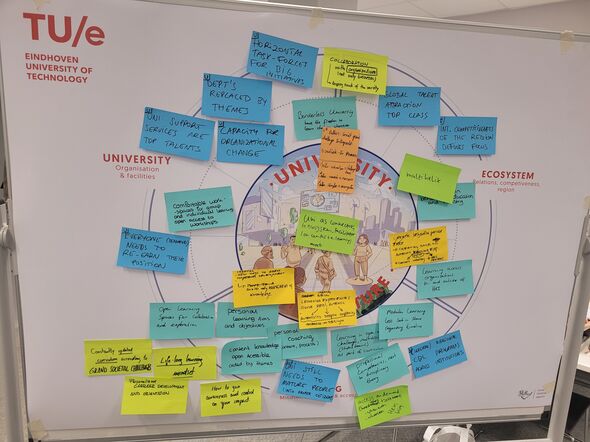
Dreaming about the university of the future
An ambitious project is meant to yield a concrete plan for the university's future educational concept
What will TU/e look like in 2050? This was the central question during the kick-off of TU/e innovation Space's project: 'University of the Future'. Last week Thursday, stakeholders from both inside and outside the university were invited to provide input during an interactive session. It was an opportunity to dream big, but also to express concerns and objections.
‘Please sit at the table with the perspective that suits you best’, is written on a large screen in the innovation Space hall where the kick-off takes place. Slowly but surely, the room fills up with participants and everyone takes a seat at one of the seven tables representing different perspectives: the university, lecturers, students, industry, professional learners, society and researchers. “We’ve invited a wide variety of people in order to provide as many different perspectives as possible”, says Marcello Sala, project leader of one of the three projects that make up the University of the Future (UotF) project. This ambitious project, funded through the Higher Education Award, is meant to yield a concrete plan for the university's future educational concept within three years.
“Our goal today is not just to gather a lot of input, but also to create support for a new vision for the future”, says Sala. There are many “future leaders” of the university here in this room today, so it’s important that we work on this together. We are very interested in their vision and ideas, but we also want them to express their concerns to help us better anticipate them.”
Stinky fish
After a brief word of welcome by Ines Lopez Arteaga, the dean of the Bachelor College, it is time for the first assignment: ‘express your stinky fish’. The idea is for everyone to listen to the critical voice inside their head whispering: "But what if things go wrong?”. That way, everyone can think of a worst-case-scenario from their own perspective and express their greatest concern.
There is an absolute silence in the room, like during an exam, as the participants write their stinky fish on post-it notes, but afterwards, lively discussions unfold at all the tables. The student table is worried about the position of Challenge-Based Learning (CBL) within education. This educational concept, which TU/e has been working on for some time, and which forms an important part of Bachelor College 2.0 involves students solving real-world problems and independently searching for the knowledge needed to do so. This requires a proactive attitude and involves students mapping out a large part of their own learning trajectory. “I worry that we won’t receive enough guidance”, says one student during the discussion at the table. “Teach us to swim; don’t just throw us into the sea.”
Once the discussion is over, participants must choose one stinky fish per table and present it to the rest. The students take the floor: “We’re concerned about the value of our degree and how it will be interpreted by the industry.” The students also wonder whether the crucial practical aspect of CBL is making university education too much like higher vocational education.
Meanwhile, the professionals learners feel that there is currently not enough emphasis on non-technical aspects in education that will be needed later in the professional field. “If you start working at ASML, you’re likely to become a project leader and that requires very different skills than the ones you need to do research, for example. You would need soft skills like leadership and self-reflection for such a position”, says one of the professionals learners on behalf of the group. The industry, in turn, is worried about the bureaucracy within the university and the lack of support staff standing in the way of close collaboration with the university. Many more criticisms are raised, including a lot of obvious ones, such as how to provide adequate facilities, staff and finances necessary for the growth of the university and the implementation of a new plan for the future.
Dreaming big
After a short coffee break, the groups are mixed up before they get to work on the second assignment. This is the time to let go of all concerns in order to create room for creativity and innovation. Participants are now free to start dreaming big about the future of the university, leaving the practical question of “how” aside for a moment. The motto is: Nothing is impossible and the sky is the limit.
Each group is given a template - a large poster on a whiteboard - depicting three important areas of the university: the university itself, education and the ecosystem, that is, its relationship with the world beyond the university, for example, the industry, the region and society. The participants have to come up with ideas of what they think is needed for each of those areas in order to create the ideal university of the future.
Before long, the posters are covered with dozens of post-it notes, and after a brief discussion, the most important findings are once again presented centrally by the individual groups. As expected, one important theme is making education increasingly flexible, which is in line with the new structure of bachelor's programs within Bachelor College 2.0. Flexible learning paths in which students can set their own learning goals, modular and interdisciplinary education, programs without fixed schedules, replacing exams with other evaluation methods, organizing education according to themes instead of departments and establishing stronger links to industry and society. All items that point to the trend of education becoming more personalized and practical in nature.
Another recurring theme is that the university should be much more closely connected to industry and more responsive to major societal challenges. Most participants agree on the “what”, but there is still plenty to discuss about the “how”. "We must ensure that the university remains critical of the industry and that research remains independent”, notes one of the students. “On the one hand, we as a university want to be involved in and have close ties with the industry and society in order to apply our knowledge, on the other hand, universities are places of free, critical thinking - where knowledge is created - and direct applicability is not always paramount. Tensions can arise in that respect, and you have to be able to strike a healthy balance”, says Johanna Höffken, assistant professor of Industrial Engineering and Innovation Sciences.
The more ideas, the better
As the participants conclude the interactive session with drinks, the UotF project team is already working on the next steps. “We’re happy with today’s input and we’re going to use all of it. We’re still diverging at this stage. We've been doing this internally for the past few months, and this session was a great first step to include stakeholders from outside the University, such as industry, other knowledge institutions and policy makers”, says Dominique Fürst, also project leader of one of the three projects that make up the UotF project (the project focusing on the ‘ecosystem’ component) and Lead Business Collaboration at innovation Space. “We’re going to plan many more of these kinds of sessions with staff, students and partners. Additionally, we are going to exchange ideas with foreign universities at international conferences. That way, we hope to map out as many different perspectives as possible, otherwise you run the risk of getting stuck in your own bubble and mindset.”
After the initial exploratory phase, the team plans to start with the next step in mid-2023: converging, i.e., making choices and fleshing out the university's concept for the future. The goal is to have a white paper with a concrete plan ready by 2024. Over the course of several steps, this will be further adapted into the final version based on feedback.
“By 2050, the entire concept of education may be radically changed”, says Sala. “If you want to study at a university now, you have to enroll in a bachelor's or master's program of several years, which requires a large investment of money and time that many people can’t (or are not willing to) afford. But let's say that you make university education accessible to other groups, so that people can brush up their knowledge in a particular field by taking a number of courses or modules. Or that the university facilitates Lifelong Learning, where learning doesn't end upon graduation, but becomes an ongoing process.” For the time being, all scenarios are open and anything is possible. “There are so many different directions it can go”, says Sala. It is important to keep thinking out of the box, he stresses. Our job for the next few months is to continue gathering as many ideas as possible. “Everyone is welcome to contribute ideas, the more different perspectives, the better”, says Sala.
Would you also like to share your thoughts on the future of the university? If so, you can contact the project group at UotF@tue.nl.



Discussion